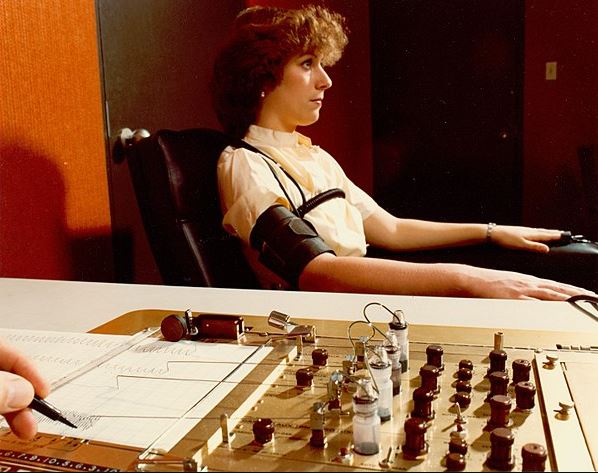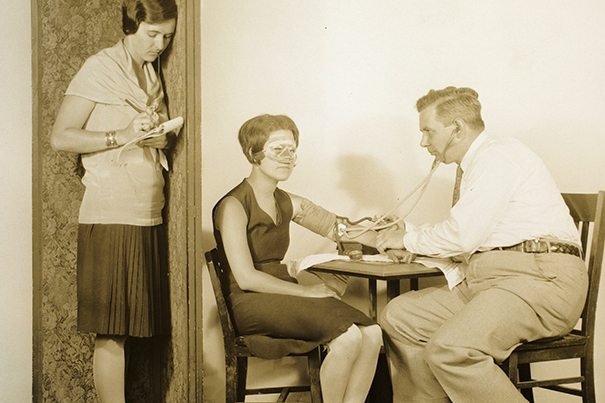The Truth About The Lie Detector Test
David Webb (Owner, writer & host of All-About-Psychology.Com)
The lie detector test (or polygraph, to give its official name) is a fascinating topic. A staple of reality TV shows and movie crime dramas, its more than likely that you already have a good idea of what a polygraph is. But did you know that the term "lie detector" is actually a misnomer? A polygraph test simply measures a person's physiological responses when answering questions; most typically, blood pressure, heart rate, sweating (galvanic skin response) and respiration (breathing rate). This is done in order to look for signs of autonomic arousal, from which deception can be inferred.
"Surely one of the most pernicious misnomers in psychology, the term 'lie detector test' is often used synonymously with the storied polygraph test. This test is misnamed: it is an arousal detector, not a lie detector because it measures non-specific psychophysiological arousal rather than the fear of detection per se." (Scott Lilienfeld).
The History of The Lie Detector
Investigating the link between physiology and deception has a long history within psychology. In 1915, William Moulton Marston began to study the physiological symptoms of deception during his time as a graduate student at Harvard University; as a result, Marston would go on to develop the first systolic blood pressure deception ('lie detector') test.
This wonderful (pun intended) image from the papers of William Moulton Marston, housed at the Schlesinger Library, shows Marston conducting one of his many experiments on blood pressure and deception.
The person in the photograph taking notes; sporting a distinctive bracelet which looks like it could be used to deflect bullets, is Olive Byrne, the inspiration behind Wonder Woman, the superhero character created by William Moulton Marston under the pseudonym Charles Moulton.
The fact that it was a psychologist who created, wrote and produced the Wonder Woman comic strip is something all psychology students should know! Marston’s work on lie detection is the reason why Wonder Woman has a Lasso of Truth! How cool is that?
Can A Polygraph Really Detect Lies?
The scientific evidence would suggest not. The American Psychological Association notes that:
...most psychologists and other scientists agree that there is little basis for the validity of polygraph tests and that the most practical advice is to remain skeptical about any conclusion wrung from a polygraph.
In 2002, a committee commissioned by the National Academy of Sciences to review and report on the scientific evidence on the polygraph, stated that:
"Almost a century of research in scientific psychology and physiology provides little basis for the expectation that a polygraph test could have extremely high accuracy. Although psychological states often associated with deception (e.g., fear of being judged deceptive) do tend to affect the physiological responses that the polygraph measures, these same states can arise in the absence of deception."
Teaching Ideas
If you teach psychology, the lie detector test is a great topic to cover with your students. Here are couple of questions you could introduce and explore as part of a class discussion.
1. What are the most likely reasons for a false-positive result i.e. when a polygraph labels an honest individual as dishonest?
2. In what other ways is it believed that we can identify the deceitful e.g. reading body language? How valid are these alternative approaches to lie detection?
About The Author
David Webb is the owner, writer and host of three websites built around his teaching and research interests; including All-About-Psychology.Com which receives over two million visits a year.
A passionate promoter of psychology through social media, over 800,000 people follow his psychology Facebook page and he is featured on the British Psychological Society list of the 100 most followed psychologists and neuroscientists on Twitter.
A bestselling author, his published work includes: The Psychology Student Guide - The Incredibly Interesting Psychology Book and, On This Day in Psychology.
This Psychology Symbol - Vintage Retro Striped Sunset T-Shirt is available from Amazon (prime eligible) in a range of colors for women and men. Sales help support this website, which has been providing free and comprehensive information and resources for psychology students and educators since 2008.
Recent Articles
-
Tourettes: Understanding Tourette Syndrome Beyond Stereotypes
Feb 23, 26 06:01 AM
Learn what tourettes really is, why swearing is a myth for most, and how education reduces stigma around Tourette syndrome. -
Psychological Impact of Catastrophic Injury & Recovery
Feb 17, 26 02:26 AM
Explore the psychological impact of catastrophic injury, including trauma, identity shifts, resilience, and long-term mental health recovery. -
Psychology Articles by David Webb
Feb 10, 26 06:31 AM
Discover psychology articles by David Webb, featuring science-based insights into why we think, feel, and behave the way we do.
Please help support this website by visiting the All About Psychology Amazon Store to check out an awesome collection of psychology books, gifts and T-shirts.
Go From The Truth About The Lie Detector Test To The Home Page







